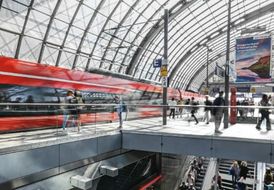National environment
DB Group
2022 Federal budget
The 2022 Federal budget was approved at the beginning of June 2022. The Federal budget for 2022 included the following significant developments for rail:
- The Federal Government’s Covid-19-related compensation measures (2021 Integrated Report) continued in 2022. These include, among other measures, train-path price support for long-distance transport, the continued payment of funds for replacement capital expenditures within the framework of the LuFV despite the decision not to pay a dividend and compensation for damages.
- The one-off increase in regionalization funds by € 3.7 billion in 2022 to finance the 9-Euro-Ticket as part of the energy relief package (€ 2.5 billion) and the continuation of half of the financing of the Covid-19 industry solution for regional transport together with the Federal states.
- Funds for the development and construction of new Federal rail infrastructure were increased from € 1.56 billion to € 1.9 billion.
- Funds for noise remediation rose from € 139 million to € 185 million.
- Facility price support for rail freight transport was reduced from € 80 million to € 40 million.
2023 Federal budget
The 2023 Federal budget was approved at the end of November 2022. There were some improvements for rail compared with the government draft of 2022. The main reason for this was the decision by the coalition committee to increase funding for rail by € 500 million in 2023 as part of the third package of relief measures and by € 1 billion in commitment appropriations for subsequent years. Compared with the approaches for 2022, there are the following significant developments for rail, among others:
- Funds for the development and construction of new Federal rail infrastructure will be increased from € 1.9 billion in 2022 to € 2.0 billion this year.
- The allocation to the European Rail Traffic Management System (ERTMS) budget item for digitalization is increasing from € 612 million to € 638 million, and € 58 million has been budgeted for measures to remedy bottlenecks and to implement the Germany in sync project (2022: € 11 million).
- Funds for attractive railway stations will be increased from € 165 million to € 262 million and cost subsidies will be made possible.
- The promotion of single wagon transport is being significantly strengthened by increasing the facility price support from € 40 million to € 85 million and the introduction of an additional funding instrument in the amount of € 80 million.
- In addition, train-path price subsidies in rail freight transport will be increased from € 350 million to € 377 million.
- In 2023, € 130 million was earmarked for train-path price support in long-distance transport (2022: € 552 million).
- The additional commitment appropriations for subsequent years are planned in particular for the requirement plan, the ERTMS budget items, attractive railway stations and the new subsidy for single wagon transport.
In addition to the increase in these rail items, regionalization funds were increased as part of the Eighth Law Amending the German Regionalization Act, as adopted in December 2022.
Package of relief measures from the Federal Government
In view of the sharp rise in energy prices, the Federal Government has decided to ease the burden. As a result, the surcharge under the Renewable Energy Sources Act (EEG) has been waived as of July 1, 2022, among other things. Funding to promote renewable energies under the EEG is financed from the Federal budget as of July 1, 2022, onwards.
In order to relieve citizens, energy taxes on mineral oil were reduced for the months of June, July and August 2022, and a 9-Euro-Ticket was introduced for use on all local public transport.
In a further package of relief measures, the Federal Government provided credit and guarantee programs for companies affected by the war. Equity support can also be provided for “large companies in the real economy across all sectors.” Energy-intensive companies can receive temporary grants due to the rise in energy prices. In this case, the price differential in excess of a doubling of the natural gas and electricity price is subsidized on a pro rata basis. This is based on the Temporary Crisis Framework of the European Commission. Energy companies trading on commodity futures exchanges are to receive liquidity support in order to be able to meet the security requirements of the energy exchanges.
In September 2022, the coalition committee passed a third support package with a volume of more than € 65 billion. An additional € 1.5 billion per year is earmarked for a nationwide local transport ticket (Germany-Ticket) if the Federal states pay at least the same amount. In addition, the package provides for an increase in the 2023 budget funds allocated to rail by € 500 million and € 1 billion for commitment appropriations in subsequent years. In addition to additional funds for track infrastructure, this will significantly increase support for single wagon transport.
Defensive shield to protect against the impact of the war in Ukraine
The Federal Government is using a financial “defensive shield” to reduce rising energy costs and the worst consequences for consumers and companies. To this end, the Economic Stabilisation Fund (Wirtschaftsstabilisierungsfonds; WSF) is being provided with additional lines of credit amounting to € 200 billion to finance the gas price and electricity price brakes. As a first step, it took the strain off households and business by generally providing them with one twelfth of annual gas and heat consumption free of charge in December 2022. Electricity and gas prices will then be limited by law for a basic level of household and company consumption. Funds from the WSF are also used to provide subsidies for the electricity price brake if the excess revenues from electricity production are not sufficient for this. The required laws (German Electricity Price Brake Act (Strompreisbremsegesetz) and the Natural Gas Heat Price Brake Act (Erdgas-Wärme-Preisbremsegesetz)) entered into force on 24 December 2022. The energy price brakes will also take the strain off rail transport.
Key points for immediate climate action program
The coalition agreement of the Federal Government states that the Climate Protection Act is to be consistently refined in 2022 and a new immediate climate action program is to be launched with all the necessary laws, regulations and measures.
In late-October 2022, inter-departmental coordination on the key points of an immediate climate action program was initiated. The immediate climate action program aims to ensure compliance with the 2030 climate protection targets. It includes measures covering all sectors.
In addition to the areas of drive changes for passenger cars, drive changes for trucks, renewable energies and electrification of air and ocean transport, digitalization, land-use and transport planning, and mobility management, the transport sector is also addressed in the areas of strengthening rail transport and strengthening urban and regional transport.
An agreement on this is to be concluded within the Federal Government by spring 2023.
Natural gas supply crisis
Against the backdrop of greatly reduced exports of Russian natural gas to the EU, the Federal Ministry for Economic Affairs and Climate Protection (BMWK) raised the alert level (second warning level) of the gas emergency plan on June 23, 2022. In addition, numerous legislative changes have already been enacted to secure the energy supply. Under Germany’s amended Energy Industry Law, coal-fired power plants that had already been shut down or that are planned to do so shortly may return to the electricity market. In addition, the consumption of natural gas for electricity may be limited. However, due to their great importance to the system as a whole, power plants for producing traction current are to be excluded from this. In order to avert a crisis, the Federal Government was authorized to create a regulation on the rail-based transport of energy sources (Energiesicherungstransportverordnung).
German Energy Security Transport Ordinance
The German Energy Security Transport Ordinance (Energiesicherungstransportverordnung, EnSiTrV) entered into force on August 30, 2022. It initially had a term of six months until the end of February 2023. With the approval of the Upper House of Parliament (Bundesrat), the term was extended until March 31, 2024. The Ordinance regulates the reprioritization of rail-based transport services and in particular makes it possible to alter the existing infrastructure use contracts in favor of energy source transport such as coal. DB Netz AG has changed its terms of use in order to implement the Ordinance.
Master Plan for Rail Transport and Germany in sync
The Master Plan is the result of the 2020 Rail Future Alliance, a key element of which is Germany in sync. In 2021, as a result of the assessment of a range of measures for Germany in sync, around 180 measures were made urgent priorities in the rail requirement plan. This is linked to a basic ability to finance the measures under the requirement plan. The assessment is based on the target schedule 2030+ drafted by independent Federal Government experts. On June 24, 2022, the first regional conference on Germany in sync was held in Mainz. In this context, Federal Transport Minister Volker Wissing informed about the Germany in sync plan and the planned expansion measures in the south-west. A further three regional conferences followed in 2022.
On July 1, 2022, the BMDV set up a special Germany in sync unit. The aims are the internal and external bundling of efforts, transparent communication and the visibility of all the activities of BMDV in relation to Germany in sync.
Rail Acceleration Commission
On December 13, 2022, the Rail Acceleration Commission presented its final report under the direction of the BMDV. The industry associations and DB Group were involved in its preparation. The Commission provides comprehensive recommendations for action to speed up planning, approval and construction processes in rail transport and to further develop financing processes. The creation of a high-performance net-work through the general renovation of highly utilized lines is proposed. In addition, the Commission supports the list of proposals for small and medium-sized measures drawn up by VDV and DB Group. Faster approval processes, especially for these measures, are to be achieved through legislation modeled on the example of the energy sector. These include, among other measures, the anchoring of the overarching public interest in railway expansion in the legislation, the waiving of land-use planning procedures and the review of species protection standards. It is also recommended to expand the catalog of measures for rail not subject to plan approval law that has already been regulated in the previous legislative period and to strengthen the planning approval. The rail partnership model already used for the Cottbus plant is recommended for faster planning and construction, among other things. In this model, the expertise of the construction companies is already incorporated in the planning phase. The Commission notes that the financing of the track infrastructure is highly complex and therefore recommends a new financing architecture. This will include, among other things, bundling of financing sources, which is to be implemented by setting up separate rail infrastructure funds. In principle, shares of additional income from truck tolls are also to be used to boost Federal funds. Several of the recommendations require amendments to existing laws, and it is recommended to consolidate them in a modern rail law, which is to be passed at the end of 2023.
Follow-up to the 9-Euro-Ticket
In late-November 2022, the Federal Government and the Federal states agreed on the introduction of a national local public transport ticket (Germany-Ticket) at a price of € 49 per month. The ticket is to be digitally distributed in a subscription that can be canceled each month. The Federal Government and the Federal states will each contribute € 1.5 billion each year to finance the ticket. The parties involved are aiming for the introduction of the Germany-Ticket on May 1, 2023.
Increase in regionalization funds
In December 2022, the German Parliament and the Upper House of Parliament passed the Eighth Act Amending the Regionalization Act. This increased regionalization funds by € 1 billion for 2022. In addition, the previous dynamic growth of 1.8% per year will be increased to 3% from 2023. In total, the change in the law will result in additional regionalization funds amounting to around €17.3 billion in the period from 2022 to 2031.
Infrastructure
Creation of a high-performance network
Federal Transport Minister Volker Wissing and DB CEO Dr. Richard Lutz announced the development of a high-performance network at a joint press conference on June 22, 2022. As part of a general renovation, DB Group bundled all planned construction work for the coming years within a line closure in a highly utilized corridor for the first time.
Telecommunications signal supply throughout rail routes
The focus is currently on implementing the supply requirements from the 5G auction in 2019. These requirements include a better supply throughout rail routes. As per the auction conditions, the railways are asked to cooperate. To meet this obligation to cooperate, DB Group has initiated the Rail Connectivity Master Plan. In exchange with the mobile phone companies, central cooperation requirements were disclosed in the project and agreements were reached on the request for cooperation services. DB broadband GmbH is also contributing to the collaboration, with its extensive offer of fiber-optic capacity along the rail routes and is thus supporting the Federal Government’s aim of ensuring a comprehensive supply via fiber-optic cables by 2030. In its Gigabit Strategy, the Federal Government is laying the foundations required for this and is supporting a synergistic mobile network expansion along the tracks with the “5 G am Gleis” (5 G On Track) initiative. The amendment to the Telecommunications Act (Telekommunikationsgesetz), which was passed in 2021, regulates the conditions governing the use of rail infrastructure and provides for a new frequency regulation target, to ensure uninterrupted connectivity along transport routes by 2026 if possible.
In 2021, DB Group reached an agreement with Deutsche Telekom and in 2022 also with Vodafone on the overachievement of the 2019 supply requirements. It was agreed that the two telecommunications companies will expand their network on DB rail lines by 2026, close existing gaps and significantly increase the performance of their networks. Across the two agreements, hundreds of millions of euros will be invested.
Freight transport
Master Plan for Rail Freight Transport
The implementation of the Master Plan for Rail Freight Transport will continue as per the procedure thus far in order to supplement the work of the Rail Future Alliance. Important issues from the Master Plan for Rail Freight Transport are also included in the Master Plan for Rail Transport. The Future Rail Freight Transport program of the Federal Government provides the basis for pro rata funding of projects in the areas of digitalization, automation and vehicle technology. As a further measure to strengthen rail freight transport, facility prices in the area of train formation have been subsidized since 2020. The funding guidelines for sidings were evaluated and published with new funding options in March 2021. Train-path price support, which also results from the master plan, has been taking the burden off rail freight transport since 2018. The budget was increased from € 350 million to
€ 377 million for 2023. The funding guidelines currently have a fixed term lasting until 2023, but this is expected to be extended after an evaluation. The funding guidelines are currently being revised.
The combined transport funding guidelines were also evaluated and revised. Following successful notification to the European Commission, the new guidelines were published on November 23, 2022. The major innovation is the first-time promotion of replacement capital expenditures. In addition, the combined transport funding was also extended to other facilities required for combined transport transhipment, such as sidings, train formation tracks and the junction switches. The funding guidelines will apply until the end of 2026.


